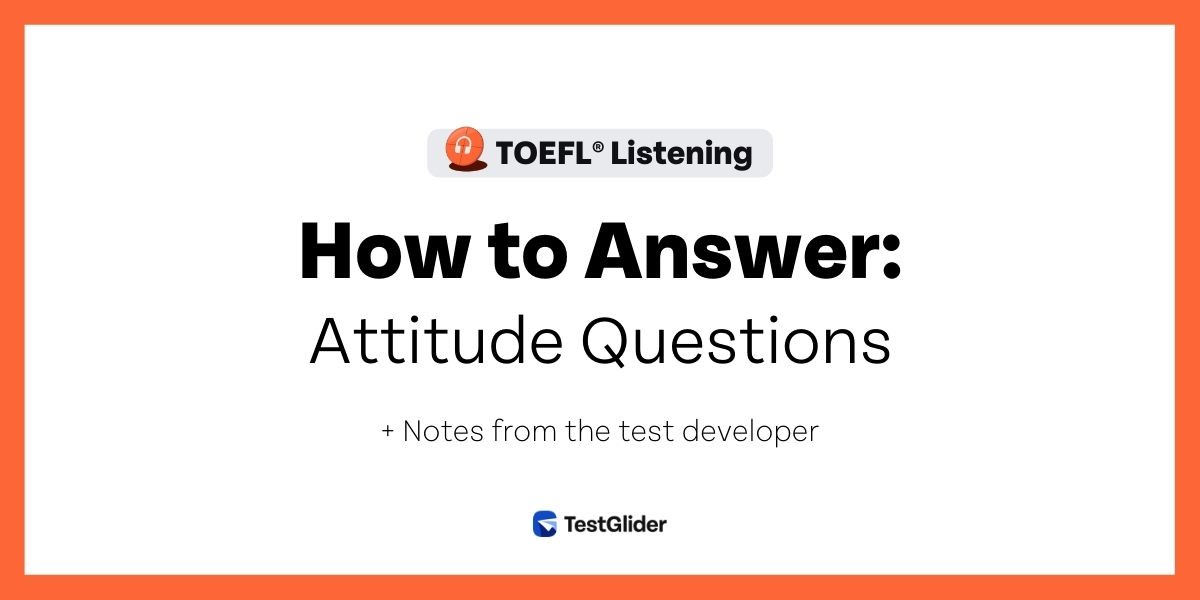1. Information about Attitude Questions
TOEFL Listening Attitude questions are similar to Inference questions in that they ask test takers to identify something that is not explicitly stated in the passage.
They require the test taker to identify the speaker’s attitude, opinion, or feelings about something mentioned in the lecture or conversation. They must rely upon the way the information was presented by the speaker to answer the question correctly.
Basically, they have to make an educated guess. There is usually only one of these questions per passage, and sometimes a passage will have no Attitude questions.
Attitude questions are easy to recognize because they are usually written as follows:
- What is the professor’s attitude about X?
- What does the student think about X?
- What attitude does the professor express when he says this: _____
- What can be inferred about the professor?
- What is the professor’s opinion about X?
2. Question Example
Here is an excerpt from a passage and its Attitude question:
University Employee
Good. Actually, I got to hear about some fascinating theories from very engaging speakers when I was a student here. You don’t see that many speaking events these days. I wonder why that is …
Female Student
Maybe because there are fewer discoveries left to be made?
University Employee
I don’t think that is really the case, but who knows? How would you like to advertise the event?
Q. What is the university employee’s attitude towards speaking events?
(A) He thinks that they are a waste of time and resources.
(B) He believes that guest speakers need to be more engaging.
(C) He thinks that there are fewer new discoveries to talk about.
(D) He doesn’t understand why they have become less common.
The correct answer is (D) because the university employee said “You don’t see that many exciting speaking events these days. I wonder why that is … ”
(A) is incorrect because it contradicts the university employee.
(B) is incorrect because the university employee did not mention the quality of current speaking events. He talked about their quantity.
(C) is incorrect because that is an explanation that the student suggested, but the university employee disagreed with her.
3. Notes from the Test Developer
TOEFL Listening Attitude questions can be rather difficult to write depending on the material. They tend to be easier to write for conversations than lectures because people express more opinions when chatting than when teaching.
When writing Attitude questions, I try to find a place where one person expresses an opinion without explicitly stating it. All of the answer choices must contain words that were used in the lecture or conversation, otherwise they do not make effective distractors. Some of them will directly contradict the passage, while others will draw illogical conclusions from the information that was mentioned.
For Attitude questions, I often include commonly held opinions on the topic that do not match the feelings that the speaker is expressing. I also like to make distractors that express ideas that the other speaker has, like answer choice (C) in the example. Since it was a different speaker, the comment will stay in the test taker’s mind, making the answer choice seem more correct.
4. Advice to Test Takers
I would advise test takers to do a few things when they need to solve an Attitude question.
First, keep in mind that you are using the words that the speaker used to determine how they feel about the overall topic or a specific aspect of it. You are not looking for what they said exactly, but what their words reveal about their thoughts.
Second, if you are unsure which answer is correct, use the process of elimination. Some answer choices may be more obviously wrong than others and easier to rule out. So, look for any answers that present information that is incorrect or was not included in the talk, or that draw illogical conclusions from the information.
Finally, the answer choices are meant to be common opinions about the topic, so you may be unable to decide between two answer choices. In that case, guess. Remember that you do not get points deducted for wrong answers in TOEFL. This is true for all questions so if you don’t know the answer or if you don’t have time to actually solve the question, guess.
In addition, you will only get to hear the lecture or conversation once, but the answers will be presented in the talk in the same order as the questions. Therefore, I recommend that you read the questions before the recording starts and answer the questions as you listen to the lecture or conversation.
